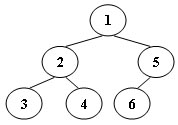03-树3 Tree Traversals Again
An inorder binary tree traversal can be implemented in a non-recursive way with a stack. For example, suppose that when a 6-node binary tree (with the keys numbered from 1 to 6) is traversed, the stack operations are: push(1); push(2); push(3); pop(); pop(); push(4); pop(); pop(); push(5); push(6); pop(); pop(). Then a unique binary tree (shown in Figure 1) can be generated from this sequence of operations. Your task is to give the postorder traversal sequence of this tree.

Input Specification:
Each input file contains one test case. For each case, the first line contains a positive integer N (≤30) which is the total number of nodes in a tree (and hence the nodes are numbered from 1 to N). Then 2N lines follow, each describes a stack operation in the format: "Push X" where X is the index of the node being pushed onto the stack; or "Pop" meaning to pop one node from the stack.
Output Specification:
For each test case, print the postorder traversal sequence of the corresponding tree in one line. A solution is guaranteed to exist. All the numbers must be separated by exactly one space, and there must be no extra space at the end of the line.
Sample Input:
6
Push 1
Push 2
Push 3
Pop
Pop
Push 4
Pop
Pop
Push 5
Push 6
Pop
Pop
Sample Output:
3 4 2 6 5 1Code
# include <iostream>
# include <cstdio>
struct Node {
int left;
int right;
};
struct Tree {
int n;
int root;
Node * treeList;
bool print_tag;
Tree(int _n) :n(_n)
{
int stack[35], top = -1;
treeList = new Node[n+1];
for (int i = 0; i <= n; ++i) treeList[i].left = treeList[i].right = -1;
char s[10];
int num;
scanf("%s%d", s, &num);
int * point = &treeList[num].left;
stack[++top] = num;
root = num;
int k = 2 * n - 1;
while (k--)
{
scanf("%s", s);
if (s[1] == 'u')
{
scanf("%d", &num);
* point = num;
stack[++top] = num;
point = &treeList[num].left;
}
else
{
int tmp = stack[top--];
point = &treeList[tmp].right;
}
}
print_tag = false;
}
void travPost(int rt)
{
if (rt == -1) return;
travPost(treeList[rt].left);
travPost(treeList[rt].right);
printf("%s%d", print_tag ? " " : "", rt);
print_tag = true;
}
};
int main(void)
{
int n;
scanf("%d", &n);
Tree t(n);
t.travPost(t.root);
return 0;
}